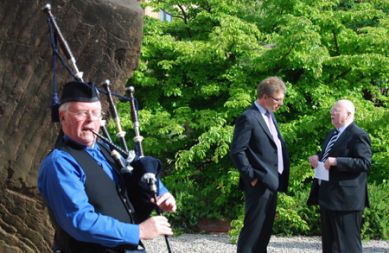Ecumenical, Evangelical Leaders Emphasize Common Mission

Leaders of the Ecumenical and Evangelical communities greeted participants of the Edinburgh 2010 conference today with a challenge to "launch together a new beginning for common mission in the 21st century."
"One hundred years after the Edinburgh conference in 1910 we are challenged to launch together a new beginning for common mission in the 21st century," World Council of Churches (WCC) General Secretary the Rev. Olav Fykse Tveit said on Thursday.
"It is important to keep a healthy dialectic and creative tension between the many dimensions of our calling," Tveit said. "To witness to Christ is both evangelism and the prophetic stand for Christ's will for justice, peace and care of creation."
Tveit also highlighted that mission and unity are inseparable: "Mission and unity belong together. To be one in Christ is to witness together to Christ."
Gathering with the theme "Witnessing to Christ today," the June 2-6 Edinburgh 2010 conference is being attended by some 300 delegates and 1,200 visitors from Orthodox, Anglican, Lutheran, Reformed, Methodist, Baptist, Seventh Day Adventist, Roman Catholic, Evangelical, Pentecostal and Independent traditions.
Organizers have touted the event as one of the most representative conferences of the diversity of world Christianity today.
Notably, the conference is also the centenary celebration of the historic 1910 World Missionary Conference (WMC) in Edinburgh that many regard as the beginning of the ecumenical movement.
Speaking alongside Tveit was the Rev. Geoff Tunnicliffe, International Director for the World Evangelical Alliance (WEA), who told the audience that it would not be realistic to expect historical differences between faith groups to be solved in a few days.
Tunnicliffe expressed his hope that during the conference, participants would be able to, "listen to one another with love and respect, build bridges rather than create chasms, pray together, learn together, establish new friendships".
Meanwhile, the event's jubilance and spirit of unity has not been without its sour notes, as the conference's previous international director of three years was barred from attending the conference just two days prior to the event's start.
South African-born Dr. Daryl Balia was prevented from entering the conference as a result of what he called "bullying and intimidation" from his fellow committee members.
Balia was disciplined for circulating two documents among the Edinburgh 2010 organizing committee that complained of "repeated acts of harassment, intimidation and bullying by former missionaries working in connection with the project.
"The moral of the story is that the missionary is free to abuse the native convert unto eternity but dare the convert stand up to defend his rights, he will be put in his place," Balia told scotsman.com
"We are trying to turn round the tide of mission history where people of colour were really treated as second class," he continued. "This conference is meant to overturn that legacy, but we seem to be caught up in the same process. I just happen to be caught in the crossfire."
Along with not being able to join the conference, Balia has been suspended by his employer and conference co-organizer the University of Edinburgh, who are currently investigating the incident.